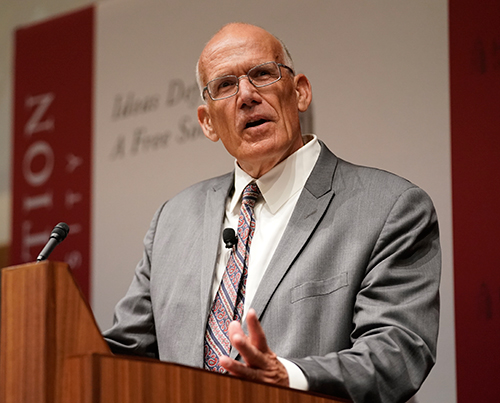風蕭蕭_Frank
以文會友維克多·戴維斯·漢森:美國對華及大國戰略
https://www.hoover.org/news/victor-davis-hanson-us-strategy-china-great-powers
維克多·戴維斯·漢森 2018年10月15日
美國應運用實力、聯盟和三角戰略,以最佳方式應對新興的“大國”競爭世界。

胡佛學者維克多·戴維斯·漢森表示,美國應運用實力、聯盟和三角戰略,以最佳方式應對新興的“大國”競爭世界。
漢森在接受采訪時表示,隨著以經濟為主導的中國的崛起及其全球霸權外交政策,後冷戰時代的全球秩序正在發生變化。
漢森是胡佛研究所馬丁和伊利·安德森高級研究員,研究和撰寫古典文學和軍事史著作。他是胡佛研究所“軍事史在當代衝突中的作用”工作組主席,該工作組於10月初召開會議,討論美國是否正在進入一個新的大國格局。大國是指在全球範圍內施加影響力的主權國家,其影響力可能來自軍事、經濟、外交或所謂的“軟”實力手段。
“精心策劃”
漢森將中國的崛起描述為在經濟和國家安全領域“精心策劃”的。因此,這使得美國及其在二戰後領導的國際體係成為日益強勢的中國的攻擊目標,而中國如今已成為世界第二大經濟體。
漢森表示:“除了美國及其盟友之外,沒有其他真正的障礙能夠阻礙中國實現其設想中的角色。”
美國決策者認為,自“9·11”事件以來,恐怖主義被廣泛認為是美國的主要安全關切;然而,他表示,中國如今已在多個方麵超越了這一威脅。
“隨著敘利亞伊斯蘭國(ISIS)幾近覆滅,以及伊朗及其恐怖分子附屬組織日益孤立,流氓國家和恐怖陰謀集團的局限性如今顯而易見。因此,民族國家重新獲得了其先前在全球恐怖分子麵前的重要性。全球化賦予了一些國家一些尖端武器,賦予它們原本無法通過自身成功獲得的影響力,”漢森說道。
他表示,非美國大國按重要性依次為中國、俄羅斯、歐盟、日本和印度。
“美國與後三個國家關係良好,與前兩個國家關係則不那麽密切。不幸的是,盡管俄羅斯擁有被大肆宣傳和令人羨慕的‘軟實力’,但俄羅斯擁有6500枚核武器,中國擁有龐大的經濟和人口,以及不斷增長的國防預算,這使得它們在某種程度上成為全球參與者,而遠比歐洲、日本和印度等更成功、更人道的社會則沒有,”他說道。
戰略與結盟
漢森表示,古老的均勢、聯盟和三角關係是美國應對其他強大競爭對手最有效的手段。
“例如,中國和俄羅斯永遠不應將自己視為比美國更親密的朋友。遺憾的是,圍繞俄羅斯勾結的恐慌阻礙了我們切實地利用俄羅斯來製衡中國,反之亦然。錯誤的決策導致兩國在朝鮮、伊朗和中東問題上走得更近,而我們卻因此付出了代價。”
漢森表示,在其他方麵,美國應該與澳大利亞、日本、菲律賓、韓國和台灣結盟,以遏製中國的侵略,並防止任何認為美國的盟友需要核武器來保護自己免受中國威脅的想法。
他表示,用今天的眼光來看,“超級大國”有著許多經典的特征。這包括擁有超過3億人口、擁有核武器、獨立的戰略空軍、遠洋海軍,以及躋身世界前五或前六的經濟規模。“按照這些綜合計算,我們是唯一的超級大國,但中國正在快速崛起,”他指出。
更多複雜性,更少存在性
漢森認為,今天的美國狀況更好,因為兩個競爭的超級大國(美國和前蘇聯)不太可能將衝突升級為核戰爭。
“話雖如此,該地區仍有許多擁有核武器的競爭大國——中國、印度、巴基斯坦、俄羅斯、朝鮮——它們不受任何超級大國的束縛,對其行動選擇也沒有任何約束,”他說道。
漢森說,這些國家之間存在著許多邊界問題以及其他類型的“尖銳而古老的分歧”。
他指出,雖然美蘇之間不存在涉及兩萬多枚核武器和兩種截然相反的信仰體係的生死攸關的斷層線,但如今存在著更多複雜性和爆發毀滅性地區戰爭的可能性。
“在某些方麵,中國比前蘇聯更難以預測,因此也更危險,”他說,“而且考慮到其經濟和人口規模,中國也更具適應能力,實力也更強。”
其發展水平遠超蘇聯,其全球霸權藍圖是多方麵的,並不一定建立在失敗的意識形態之上。
漢森表示,近幾十年來,西方社會犯下了嚴重的錯誤,認為“軟實力”能夠威懾侵略性國家。
“我認為,我們在21世紀看到了20世紀許多流行觀念的缺陷,這些觀念包括希望“軟實力”與硬實力相提並論(歐盟的經濟和聲譽無法阻止普京幹預他想幹預的事情),希望全球財富必然導致民主化和自由化(這在中國顯然沒有實現),以及希望全球機構將取代民族國家(聯合國和國際刑事法院既缺乏民主國家的權力,也缺乏民主國家的道德)。”他說道。
最後,漢森指出,美國領導人錯誤地認為,美國可以先發製人地入侵其他國家,推翻獨裁者,以避免災難和威脅——並在事後奇跡般地“使失敗國家的殘餘民主化”。
他說:“阿富汗、利比亞、伊拉克和敘利亞盡管偶爾會平靜下來,但看起來永遠不會像卡梅爾,甚至底特律或芝加哥那樣。”
Victor Davis Hanson: US Strategy On China, Great Powers
https://www.hoover.org/news/victor-davis-hanson-us-strategy-china-great-powers
Victor Davis Hanson October 15, 2018
The United States should use a strategy of power, alliances, and triangulation to best navigate the emerging world of “great power” rivalries。
The post-Cold War global order is in flux with the ascendency of an economically-driven China and its foreign policy of global hegemony, said Hanson in an interview.
Hanson, the Martin and Illie Anderson Senior Fellow at the Hoover Institution, studies and writes about the classics and military history. He is the chair of the Hoover Institution’s Working Group on the Role of Military History in Contemporary Conflict, which met in early October to discuss whether the United States is entering a new great power landscape. A great power is a sovereign state that exerts influence on a global scale, whether through military, economic, diplomatic or so-called “soft” power methods.
“Calibrated and Planned”
Hanson describes China’s rise as “calibrated and planned” in the areas of economics and national security. As such, this puts the United States and the international system it led after World War II in the crosshairs of an increasingly assertive China, which now has the world’s second largest economy.
“There is no other real impediment to China’s envisioned role other than the US and its allies,” said Hanson.
Since 9/11, terrorism was widely considered America’s chief security concern, according to US policymakers; however, China has now eclipsed that threat on more fronts than one, he said.
“The limitations of rogue states and terrorist cabals are now apparent with the near destruction of ISIS in Syria and the growing isolation of Iran and its terrorist appendages. So, nation states have regained their prior importance over global terrorists. And globalization has given a number of states some sophisticated weaponry that gives them clout otherwise not earned by their own success,” Hanson said.
The ranks of non-American great powers, in descending order of importance, are China, Russia, the European Union, Japan, and India, he said.
“The US enjoys good relations with the latter three; not so much with the former two. Unfortunately for all the ballyhooed and enviable ‘soft power,’ Russia’s 6,500 nuclear weapons and China’s huge economy and population, and growing defense budget make them global players in a way the far more successful and humane societies of Europe and Japan, and India as well, do not,” he said.
Strategies, Alignments
The ancient methods of balance of power, alliances, and triangulation are the most effective means for the United States to deal with other great rival powers, Hanson said.
“For example, China and Russia should never consider either a closer friend than each does respectively the US. It is a pity that the hysteria over Russian collusion has prevented us from a realist use of Russia to balance at times China and vice versa. Poor decisions have brought the two closer together at our expense vis-á-vis North Korea, Iran, and the Middle East,” he added.
On other fronts, the United States should be aligning with Australia, Japan, the Philippines, South Korea, and Taiwan to deter Chinese aggression, and to ward off any idea that America’s allies will need nuclear weapons to protect themselves from China, Hanson said.
A number of classical distinctions mark “superpowers” in today’s terms, he said. This includes having a population over 300 million, the possession of nuclear weapons, an independent strategic air force, a blue-water navy, and an economy in the world’s top five or six. “By these inclusive calculations, we are the only superpower, but China is gaining fast,” he noted.
More Complexities, Less Existential
Hanson believes America is better off today because it is less likely that two rival superpowers (the United States and the former Soviet Union) would escalate conflict toward a nuclear war.
“That said, there are a number of rival regional powers with nuclear weapons—China, India, Pakistan, Russia, North Korea—that are not beholden to any superpower and have no restraint whatsoever on their choices of action,” he said.
Those countries have a number of border and other sorts of “sharp and ancient disagreements,” Hanson said.
While there are no existential Soviet-American fault lines involving 20,000 plus nuclear weapons and two antithetical belief systems, today more complexities and opportunities for devastating regional wars exist, he noted.
“China in some ways is a much less predictable and thus more dangerous rival than the old Soviet Union,” he said, “and is far more adaptable and powerful, given that its economy and population dwarf those of the Soviet Union, and its blueprint for global hegemony is multifaceted and not necessarily invested in a failed ideology.”
Western societies in recent decades made critical mistakes assuming “soft power” could deter aggressive states, Hanson said.
“I think we saw in the twenty-first century the shortcomings of a number of popular twentieth-century ideas from the hope that “soft power” was comparable to hard power (the EU economy and reputation cannot stop Putin from intervening where he wishes), that global wealth invariably leads to democratization and liberalization (it certainly did not in China), and that global institutions will replace the nation state (the United Nations and International Criminal Court lack both the power and morality of democratic nations),” he said.
Finally, Hanson noted America’s leaders erroneously believed that the United States could preemptively invade countries and remove dictators in order to stave off disasters and threats—and in the aftermath somehow miraculously “democratize the detritus of failed states.”
He said, “Afghanistan, Libya, Iraq, and Syria, despite occasional calm, do not seem they are ever going to look like Carmel or even Detroit or Chicago.”




